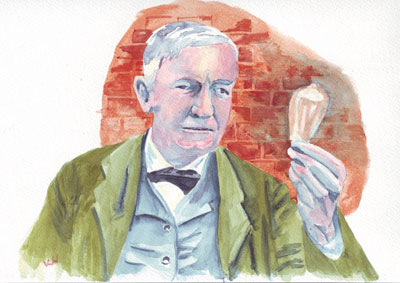Finding jobs in Paris: The CV
The first step to finding jobs in Paris is to Frenchify your CV. Some readers may not even know what a CV is given that the term used in the United States is, ironically, the French word résumé (generally written without the accents). In the long run resume means the same thing: to sum up. CV stands for Curriculum Vitae which is a Latin expression which can be loosely translated as [the] course of [my] life. In that sense a French CV or an English one is the same and they tend to be longer than the North American resume which does not exceed one page and does not necessarily include the entire work history.
So how does one construct a French CV, because in fact it needs to be constructed from the ground up and not just translated especially when your working document is a resume. There is no strict style or order to respect although most of the time they are organized chronologically or sometimes by theme or career path. You can personalized it to put forward your best qualities while remaining formal and factual with little self-promotion – leave that for the cover letter and even there keep it cool. This is a history of your work life, not an advertisement. Graphic designers use more graphics and administrative employees use less fancy typography. Nearly all however integrate a small frontal portrait photo.
In many ways, a French CV is much easier than an English one as you have one rule « just state the facts ma’am/sir ».
INFORMATION
Obviously, you need to put your name, address, telephone number and email at the top. Surnames are generally written in all capitals. In addition in France, you should also put your date of birth (or age), nationality and marital status including number of children, mention your driver’s license type and whether you have work papers (important for those who come from a non-European country). Some employers these days ask for an anonymous CV (see below) whereas others ask for a photo. Be sure to respond exactly to the requirements in the employment offer.

Opportunity is missed by most people because it is dressed in overalls and looks like work. — Thomas A. Edison
FORMATION (training, education)
This section is not too different from a British CV. List briefly, beginning with the most recent, where and what you have studied and your qualification. It is suggested to make an attempt to find equivalents for the qualifications in French. For example, GCSE’s are roughly equivalent to le brevet and A- Levels or high school diploma to le baccalauréat. Most French CVs do not show the grade you received, but if you have done well in a particular field use the word mention. For example, if you got a First or graduated Cum Laude, write something like mention très honorable. If you are in an academic field also include teaching and research experience, publications, presentations, awards, honors, affiliations, and other pertinent details.
EXPÉRIENCE PROFESSIONNELLE
This is where the real difference between French and English CVs lies. In English, after you have listed some of your previous work experience, you should write a few words about what your role required and the skills you gained. This is unnecessary in France. Simply write your role and the company you worked for. Name of company, location, dates of employment, title, responsibilities, and notable achievements. For example:
Avril 2013 – décembre 2014. FUSAC. Paris, France. Assistante administrative. Suivi des petites annonces et service client.
Connaissances linguistiques et informatiques
List your computer software and operating systems that are pertinent to the position as well as languages spoken and their level.
CENTRES D’INTÉRÊT
This could be an optional section, where you display your hobbies and interests or some accomplishment that makes you interesting or sets you apart.
In general:
- Spell things out rather than use abbreviations which may not be understood by a non anglophone reader, such as state names, position names.
- Have a native French speaker proofread.
- References are not added unless specifically requested.
This Wikipedia article in French gives some interesting insights into the differences in CVs from country to country which may help you when applying for jobs in Paris. And About.com gives some examples of CVs.
Anonymous CV: The anonymous CV is a CV on which the name, age, sex, birthplace, residence, nationality, photo and even email have been removed. The objective being to promote diversity and equal opportunity which is sometimes tarnished based on these details. In principle and according to the Loi du 31 mars 2006 pour l’égalité des chances anonymous CVs should be obligatory for companies which have over 50 employees. The law has never been decreed despite the fact that the Conseil d’État ordered the government to publish the decree before January 2015 (read Le Figaro). Thus the debate on the efficacity of the CV anonyme is still open. So in practice what should you do? Renseignez-vous before sending in your application on how to present your CV and of course your contact details which must be included quand même.
And don’t forget to give thorough consideration to your cover letter when applying for jobs in Paris. As an employer myself I have seen many standard cover letters that don’t tell us anything about the person. In fact I look at the cover letter first. And I ask: is it addressed to me? is it addressed to FUSAC? does it mention the job in question? is it friendly? does it show humor? is it pompous? is everything spelled correctly? You would be surprised how many letters contain misspellings and even slips such as to send to FUSAC a letter that is addressed to Dominos Pizza! We’ve seen it all and many CVs are binned tout de suite because of their sloppy cover letter.
Here is another FUSAC article about writing letters in France.


